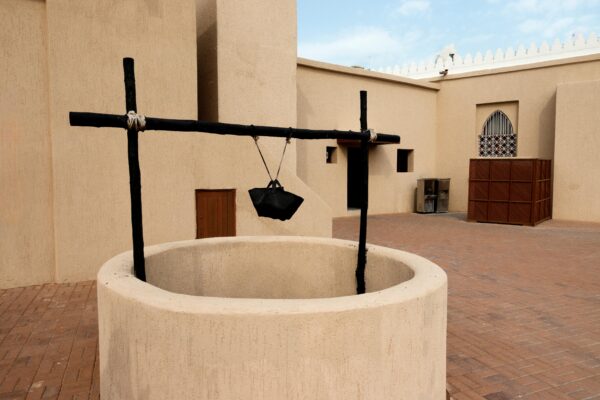
6 Wealth-Building Lessons from Khadijah (RA) Every Muslim Should Know
03 December 2025 8 min read


Adil Hussain
Head of Content
7 min read
Last updated on:
We’ve all been there. Money stress. The feeling of not knowing whether you’re saving enough, investing right, or making the best financial decisions. When that happens, most people turn to financial gurus, TikTok influencers, or self-help books.
But here’s the thing. The best financial advice? It’s been sitting in the Quran this whole time.
And there’s one surah in particular that might just change the way you think about money, Surah Kahf.
It’s not a “money” surah in the way you might expect. But within its stories, you’ll find timeless lessons on wealth, arrogance, risk, and financial responsibility. Lessons that are more relevant today than ever.
In this article, we’re breaking down some of the most powerful financial takeaways from Surah Kahf and how they can help you level up your money game while staying true to your faith.
Surah Kahf is told through a series of stories. The first two lessons here focus on the story of the time Prophet Musa (Moses) AS travelled with Khidr AS to learn from him the special knowledge that Allah SWT had taught him.
During their journey, some poor fishermen generously offered them passage on their boat. At the end of the ride, Khidr inexplicably damaged the boat, creating a hole.
“So they set out, but after they had boarded a ship, the man made a hole in it. Moses protested, “Have you done this to drown its people? You have certainly done a terrible thing!”” (18:71)
Can you imagine how the fishermen felt?
They had given a ride to 2 strangers for free and in return their prized possession was damaged.
Even Prophet Musa AS was shocked by Khidr’s action.
Why on earth would someone do such a thing and why is this story in the Quran?
The answer will make us realise that there is always a bigger picture, often beyond our immediate understanding.
Later in the story, Khidr reveals his reasoning. A tyrannical king in the area was seizing all the boats he could find. By damaging the boat, Khidr ensured it wouldn’t be stolen.
“As for the ship, it belonged to some poor people, working at sea. So I intended to damage it, for there was a ˹tyrant˺ king ahead of them who seizes every ˹good˺ ship by force.” (18:79)
Imagine how the fishermen’s anger and despair would have turned to joy and gratitude once this became evident to them!
What’s the lesson here?
1. If you want to protect your wealth you should use it in the path of Allah (God) SWT. The fishermen used their boat to help strangers and in return, it was protected from a major threat.
2. When facing challenges, financial or otherwise, remember this story. There’s a grand plan unfolding, and Allah (SWT) knows best. In essence, have Tawakkul (trust in Allah).
In the same story after their encounter with the fishermen, Prophet Musa and Khidr came to a town which refused to host them and provide them with food and water.
‘So they moved on until they came to the people of a town. They asked them for food, but the people refused to give them hospitality. There they found a wall ready to collapse, so the man set it right. Moses protested, “If you wanted, you could have demanded a fee for this.”‘ (18:77)
It was an accepted norm back then that travellers were entitled to a drink from the town well and some basic food so it was quite something when the inhabitants of the town refused.
Nevertheless, on their way out, they found a wall that was on the verge of collapse. Khidr then stopped and rebuilt the wall brick by brick.
A hungry, tired and insulted Prophet Musa questioned Khidr for not taking payment (money or food).
Khidr responded: “As for the wall, it belonged to two orphan boys in the city, and under the wall was a treasure that belonged to them, and their father had been a righteous man. So your Lord willed that these children should come of age and retrieve their treasure, as a mercy from your Lord” (18:82)
What’s the moral of the story?
The parents were righteous so Allah SWT ensured their kids would be looked after. (The children were too young to defend their treasure so it was more appropriate for them to discover it at an age when they could protect it).
So be righteous parents and your Lord will provide.
One of the most striking financial lessons in Surah Kahf comes from the story of the man with two gardens.
“Give them ˹O Prophet˺ an example of two men. To ˹the disbelieving˺ one We gave two gardens of grapevines, which We surrounded with palm trees and placed ˹various˺ crops in between.” (18:32)
This man was blessed with vast wealth—two lush gardens, abundant crops, and flowing rivers. But instead of being grateful, he became arrogant, believing his success was self-made and would never fade.
“And he entered his property, while wronging his soul, saying, ‘I do not think this will ever perish, nor do I think the Hour will ˹ever˺ come. And if in fact I am returned to my Lord, I will definitely get a far better outcome than ˹all˺ this.’” (18:35-36)
His companion, a poorer but wiser man, reminded him that everything comes from Allah and warned him against pride. But he refused to listen. Then, in an instant, his wealth was wiped away.
“So his produce was ˹totally˺ ruined, so he started to wring his hands for all he had spent on it, while it had collapsed on its trellises. He cried, ‘I wish I had never associated anyone with my Lord ˹in worship˺!’” (18:42)
Imagine the shock. One day, he had everything. The next, it was all gone.
So, what’s the lesson here?
The other man in the story reveals the answer:
“If only you had said, upon entering your property, ‘This is what Allah has willed! There is no power except with Allah!’” (18:39)
Instead of becoming arrogant, he should have humbled himself and remembered that all of his provision came from Allah SWT.
The lesson for us is that whenever we start feeling overly pleased with ourselves, believing we’ve “made it,” we should take a step back, humble ourselves, and remind ourselves of Who truly provides by reciting the phrase:
مَا شَآءَ ٱللَّهُ لَا قُوَّةَ إِلَّا بِٱللَّهِ ۚ
‘This is what Allah has willed! There is no power except with Allah!’
After the story of the man with the two gardens, Allah says:
“Wealth and children are [but] adornment of the worldly life. But the enduring good deeds are better to your Lord for reward and better for [one’s] hope.” (18:46)
Wealth and children are blessings, but they are temporary—they decorate our lives but do not define our success in the akhirah. What truly lasts are the good deeds that endure beyond this world.
Allah reminds us elsewhere in the Qur’an:
📖 “Your wealth and your children are only a trial, whereas Allah! With Him is a great reward (Paradise).” (Qur’an 64:15)
So what are some examples of ‘good righteous deeds that last’?
There’s a famous hadith where the Prophet ﷺ said:
📖 “When a person dies, his deeds come to an end except for three: ongoing charity, beneficial knowledge, or a righteous child who prays for him.” (Muslim)
So think beyond the dunya and send something good for your akhirah.
At the start of surah Kahf, Allah reminds us:
“We have indeed made whatever is on earth as an adornment for it, in order to test which of them is best in deeds. And We will certainly reduce whatever is on it to barren ground.” (18:7-8)
This verse is a powerful reality check. Everything we chase—money, status, property—it’s all temporary. Wealth is not the goal; it’s a test. Allah has decorated the world with riches and comforts not for us to hoard, but to see how we use them.
So, how do we pass this test when it comes to our wealth?
Surah Kahf is just one example of the deep financial wisdom found in the Quran. From the importance of humility in wealth to trusting Allah’s plan in financial hardship, these lessons aren’t just stories—they’re blueprints for how we should manage our money and navigate life.
And the truth is, there’s so much more. The Quran is filled with guidance on wealth, business, ethics, and barakah. Yet, how often do we turn to it for financial advice?
If you found this beneficial, don’t keep the khayr to yourself and share this with someone! The Prophet ﷺ said: “Whoever guides someone to goodness will have a reward like one who did it.” (Muslim 1893)
For more financial lessons from the Qur’an, you can download our free ebook containing 30 bitesize lessons on how to manage your money in a way that pleases Allah here.

03 December 2025 8 min read

13 August 2025 12 min read
Leave a Reply